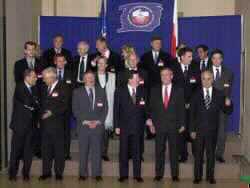In remarks likely to ease tensions with Washington over Iraq, NATO Secretary General George Robertson warned allies Tuesday of "criminal states" armed with weapons of mass destruction. Robertson did not refer specifically to Iraq in his comments opening a meeting of defense ministers in Warsaw. But his warning -- along with a call to smash the threats when deterrence fails -- were likely to comfort the United States, which has been irritated by European misgivings over military action against Baghdad.
"We need...to think very carefully about the role of this alliance in the future, not least in protecting our citizens from criminal terrorists and criminal states, especially where they are armed with weapons designed for massive and indiscriminate destruction," Robertson said.
"Our common aim must be to maintain the will and the capabilities to deter those 21st century threats where possible, to root them out and destroy them where deterrence has broken down."
CIA Deputy Director John McLaughlin, flanked by Defense Secretary Donald Rumsfeld, was set to brief the ministers in the afternoon on threats Washington believes are posed by Iraq.
A similar classified briefing in June had dwelt more generally on the dangers of biological and chemical weapons.
Washington's closest ally, Britain, released a dossier on Tuesday setting out Prime Minister Tony Blair case for action against Iraq. It said Iraqi President Saddam Hussein was building up stocks of chemical and biological weapons and was "ready to use them."
But most European allies are reticent or flatly opposed to a strike against Iraq, with Germany taking the firmest stand.
Rumsfeld said Monday that criticism of U.S. policy during Germany's election campaign had "poisoned" relations between Berlin and Washington, and he ruled out a bilateral meeting with his German counterpart in Warsaw.
Diplomats said Rumsfeld would seek to persuade allies in Warsaw of the need for a tough new resolution in the U.N. Security Council demanding Iraq disarm or face possible attack.
Baghdad's announcement a week ago that it would accept U.N. weapons inspectors without conditions has complicated the Bush administration's attempts to secure a new resolution, although British officials say a draft could be submitted in days.
NATO STRIKE FORCE
Rumsfeld was also set to call at the NATO meeting for the creation of an alliance strike force of up to 20,000 troops to conduct military operations anywhere in the world, with a core of 5,000 that could be deployed in seven to 30 days.
No one is suggesting that the "NATO Response Force" could be used in a strike against Iraq. Indeed, Rumsfeld told reporters on the plane to Warsaw that the prospect of the defense alliance plunging into such a conflict had not even crossed his mind.
Rather, diplomats see the plan as a long-term and low-cost way of shoring up the credibility of the defense alliance, which was sidelined in the U.S.-led war against terrorism after the attacks on the United States on September 11 last year.
"NATO played the key role in defeating the threats of the Cold War and indeed the instability that was to follow," Robertson said.
"We must now transform our alliance so that it can play an equally pivotal part in the war against terrorism and the dangers of weapons of mass destruction."
Robertson has warned European allies time and time again that unless they modernize their military capabilities they risk being marginalized by the might of the United States.
Last year the United States spent 85 percent more on defense than the other 18 allies combined. France and Britain have pledged to increase their defense spending, but most European countries -- facing strict budget limits and sluggish economies -- are unlikely to follow suit any time soon.
The defense ministers' meeting is supposed to set the scene for NATO's summit in Prague this November, when allies will launch a new initiative to build military capability, setting out specifically which countries should do what and by when.
PHOTO CAPTION
NATO defense ministers gather for a group photo during a break in their informal meeting in Warsaw, Tuesday, Sept. 24, 2002. Eighteen defense ministers came to Warsaw for a last meeting before the alliance summit in Prague on November 2002. From second right front are: U.S. Defense Secretary Donald H. Rumsfeld and NATO Secretary-General Lord Robertson. Behind Robertson second row is German Defense Minister Peter Struck. (AP Photo/Alik Keplic
- Author:
& News Agencies - Section:
WORLD HEADLINES


 Home
Home Discover Islam
Discover Islam Quran Recitations
Quran Recitations Lectures
Lectures
 Fatwa
Fatwa Articles
Articles Fiqh
Fiqh E-Books
E-Books Boys & Girls
Boys & Girls  Hajj Rulings
Hajj Rulings Hajj Fatwas
Hajj Fatwas














